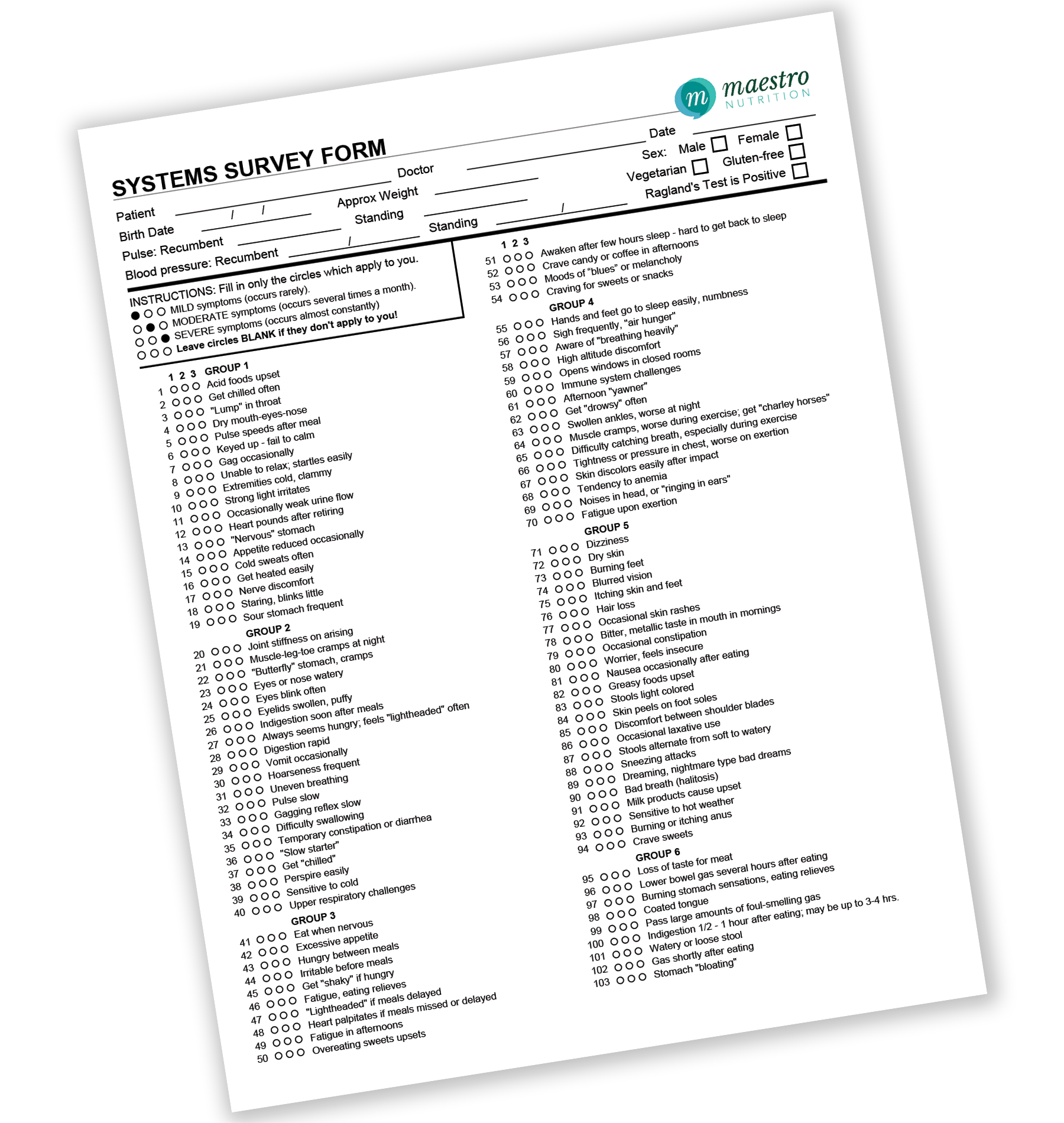What is the Systems Survey Form?
The origin of the Systems Survey can be traced back to nutritional pioneers Melvin Page, DDS, and Royal Lee, DDS, and has evolved over the decades. The survey comprises a set of questions focusing on symptoms associated with the organs and glands of the body. While individual symptoms hold significance, patterns of various symptoms can unveil underlying health imbalances, often leading to the root causes of such issues.
Intended for use by practitioners, the survey assesses patients’ nutritional needs from a holistic “whole system” perspective. It sheds light on areas of health that may require attention, assisting practitioners in developing customized nutrition protocols and recommending supplements tailored to individual needs. This approach ensures that patients receive precise support tailored to their unique health requirements.

Sympathetic & Parasympathetic Dominance (Groups 1 & 2):
- Evaluate the autonomic nervous system, focusing on the balance between the sympathetic (fight or flight) and parasympathetic (rest and digest) systems.
- Sympathetic Dominance is likened to a body’s gas pedal, accelerating body processes and reacting to stress, potentially hindering the operation of the Parasympathetic side.
- Parasympathetic Dominance, resembling the body’s brakes, focuses on rest and repair but can impede Sympathetic functions when dominant.
- Symptoms and nutritional support are outlined for both sides.
Group 3: Sugar Handling
- Involves managing dietary carbohydrates, impacting both the Sympathetic and Parasympathetic systems.
- Symptoms range from headaches to more severe conditions like diabetes, necessitating dietary and lifestyle adjustments.
Group 4: Cardiovascular
- Assesses the need for nutritional support for heart and circulatory system health.
- Symptoms suggest a need for dietary and lifestyle changes to support cardiovascular function.
Group 5: Biliary and Liver Dysfunction
- Focuses on the need for nutritional support for liver and gallbladder function, crucial for detoxification and fat metabolism.
- Symptoms and recommendations for dietary changes and possibly detoxification are outlined.
Group 6: Digestive
- Points to the need for nutritional support for protein metabolism.
- Symptoms include heartburn and bathroom difficulties, with suggestions for dietary adjustments and enzyme supplements.
Group 7: Endocrine
Hyperthyroid (7a), Hypothyroid (7b), Hyperpituitary (7c), Hypopituitary (7d), Hyperadrenal (7e), Hypoadrenal (7f)
- Broken into six parts, addresses issues related to hypothalamus, pituitary, adrenal, thyroid, and gonad function.
- Symptoms and nutritional recommendations are provided for each endocrine condition.
Group 8: Foundational Issues
- Revolves around Vitamin B complex deficiencies affecting nerve function, energy production, and overall health.
- Recommends a diet rich in whole foods and possibly supplements for balance.
Group F: Female
- Addresses female endocrine issues from preadolescence to post-menopause.
- Recommends diverse nutritional support for reproductive health, including herbal extracts and lifestyle changes.
Group M: Male
- Focuses on male endocrine concerns requiring varied nutritional support for reproductive health, energy, libido, and stress management.
- Recommendations include dietary changes and herbal supplements for a balanced system.
5 Main Complaints
- Likely the most important part of the survey
- Provides a place for your patients to articulate why they need your help, beyond symptoms
- Physical or lifestyle challenges, such as work stress, family issues, inabilities, that may be the root cause of some, many, or all of their issues.
- Recommendations here are dependent and based upon the practitioner-patient conversation.